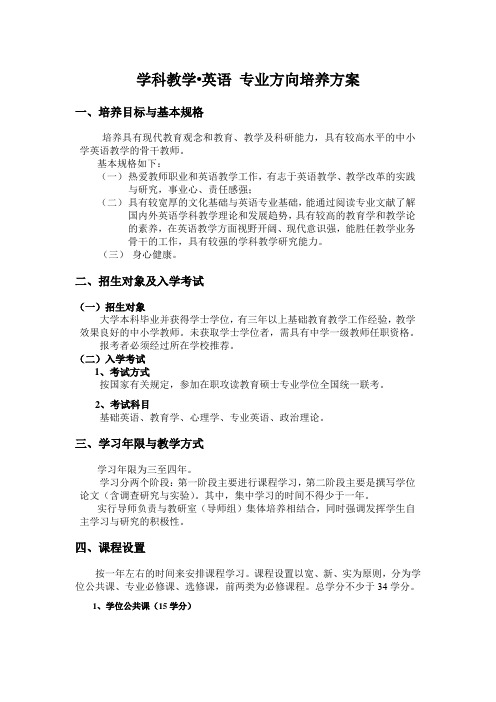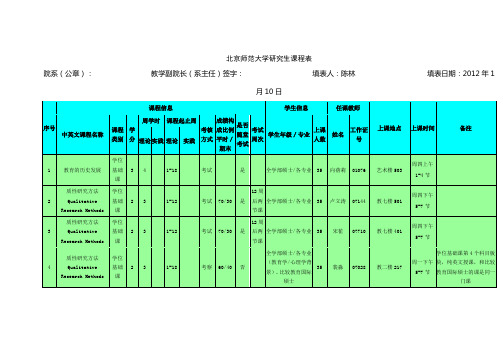北京师范大学研究生课程教学大纲建议模版课程名称英文名称
- 格式:doc
- 大小:23.00 KB
- 文档页数:2


学科教学•英语专业方向培养方案一、培养目标与基本规格培养具有现代教育观念和教育、教学及科研能力,具有较高水平的中小学英语教学的骨干教师。
基本规格如下:(一)热爱教师职业和英语教学工作,有志于英语教学、教学改革的实践与研究,事业心、责任感强;(二)具有较宽厚的文化基础与英语专业基础,能通过阅读专业文献了解国内外英语学科教学理论和发展趋势,具有较高的教育学和教学论的素养,在英语教学方面视野开阔、现代意识强,能胜任教学业务骨干的工作,具有较强的学科教学研究能力。
(三)身心健康。
二、招生对象及入学考试(一)招生对象大学本科毕业并获得学士学位,有三年以上基础教育教学工作经验,教学效果良好的中小学教师。
未获取学士学位者,需具有中学一级教师任职资格。
报考者必须经过所在学校推荐。
(二)入学考试1、考试方式按国家有关规定,参加在职攻读教育硕士专业学位全国统一联考。
2、考试科目基础英语、教育学、心理学、专业英语、政治理论。
三、学习年限与教学方式学习年限为三至四年。
学习分两个阶段:第一阶段主要进行课程学习,第二阶段主要是撰写学位论文(含调查研究与实验)。
其中,集中学习的时间不得少于一年。
实行导师负责与教研室(导师组)集体培养相结合,同时强调发挥学生自主学习与研究的积极性。
四、课程设置按一年左右的时间来安排课程学习。
课程设置以宽、新、实为原则,分为学位公共课、专业必修课、选修课,前两类为必修课程。
总学分不少于34学分。
1、学位公共课(15学分)2、专业必修课(至少15学分)3、选修课(至少4学分)五、学位论文工作及学位授予修满学分后方可进入撰写学位论文阶段。
论文内容应紧密联系本学科中学教学的实际,并有一定的理论分析与概括。
论文要在导师(或导师组)的指导下由学生独立完成。
论文的格式应符合规范要求。
论文必须在研究生院规定的日期以前全部完成,并打印成册,按研究生院规定的程序申请答辩。
论文评阅人和答辩委员会成员中,必须至少有一名熟悉中小学英语教学、具有高级专业技术职务的本专业方向的专家。

《心理统计学》教学大纲课程编号:111048课程名称:心理统计学课程英文名称:Psychological Statistics课程类别:专业教育课课程性质:必修课学时(理论+实践):48学分:3开课学期:3选用教材:张厚粲,徐建平著.现代心理与教育统计学(第3版).北京师范大学出版社,2009年主要参考书:徐建平,张厚粲主编.《现代心理与教育统计学》学习指导.北京师范大学出版社,2011 年;甘怡群等编著.心理与行为科学统计.北京大学出版社,2005年;张敏强.教育与心理统计学(第二版).北京:人民教育出版社,2002 ;王孝玲.教育统计学(第一版).上海:华东师范大学出版社,2001 ;邵志芳著.心理与教育统计学.上海:上海科学普及出版社,2004。
中英文课程简介:心理统计学是专门研究如何运用统计学原理与方法,、整理、分析心理学研究中获得的随机性数据资料,并根据这些数据资料传递的信息,进行科学推论,找出心理活动规律的一门学科。
具体讲,就是在心理学研究中,通过调查、实验、测量等手段有意获取一些数据,并将得到的数据按统计学原理和步骤加以整理、计算、绘制图表、分析、判断、推理,最后得出结论的一种研究方法。
心理统计学作为一门应用统计学科,与数理统计学既有密切联系,又不完全相同。
心理统计偏重于数理统计方法如何在心理学研究中的应用,因而对各种统计公式的推导即理论上的证明较少,着重介绍各种统计方法在不同的心理学研究中应用的条件和具体方法,及其统计计算结果的解释。
Psychological Statistics is designed to study how to collect, collate, analyze the random data in psychological research with the statistical theories and methods and identify the law of mental processes through scientific reasoning based on these data. Specifically, it is a kind of research method to get some data through surveys, experiments, measurements and other ways, and collate, calculate, chart, analyze and reason these data obtained by statistical principles to get conclusions in psychological researches. As a subject of applied statistics, Psychological Statistics is linked with mathematical statistics, but not identical. It puts emphasis on the applications of mathematical statistics in psychological researches, different conditions and specific methods in the application, and the statistical interpretation of the results.2、各章节大纲内容及学时分配第一章绪论(3学时)1.教学目的与要求了解心理与教育统计的性质、定义、开展历史、研究内容、选择使用统计方法的步骤;理解统计数据的基本类型,心理与教育统计的一些基本概念。

资源学院选课同学:本学年第二学期的课程表如下,其中上课时间和地点是临时的,下学期开学后会有调整。
请大家到教学秘书卢立新处报名,以便任课教师安排。
注:李京老师的GIS原理与应用课程只限本专业研究生选课,且最多10人。
2003—2004学年第二学期 开课单位(盖章): 资源学院 填表人:顾 卫 填表日期:2003年12月课程 编号 课 程 名 称 学分 授课教师 及职称 上课地点 上课时间课程类型 授课对象 考试方式 人数 备 注 专业 各个专业 0705009 高等经济地理学 3 梁进社 教 授 周二5~7节 基础课 年级 2003级 闭卷 20 需多媒体教室 专业 各个专业 0705005 自然资源生态学 3 江 源 教 授 周五1、2节 基础课 年级 2003级闭卷 20 需多媒体教室 专业 生态学、地理学 0705123干旱区资源利用与生态保护研究 3 李 波 副教授 周四1、2节 专业课 年级 2003级 闭卷 20 需多媒体教室 专业 各个专业 0705110 城市生态学 3 康慕谊 教 授 周二1、2节 专业课 年级 2003级 闭卷 30 需多媒体教室 专业 各个专业 0705112 自然灾害学原理 3 史培军 教 授 周一晚 专业课 年级 2003级 闭卷 50 需多媒体教室 专业 各个专业 0705106 地理学/生态学前沿讲座 1哈 斯 副教授 李晓兵 副教授 自行安排 周五晚 专业课 年级 2003级闭卷 50 需多媒体教室 专业 地理学、生态学 0705139 区域气候资源与应用气候学 3顾 卫 教 授 李 宁 副教授 周二3、4节专业课 年级2003级闭卷20 需多媒体教室 填表说明:1.用英语授课的,请在备注栏中注明;分单双周上课的,应在备注中注明。
2.不在开学第一周上课的,应在备注中注明从第几周开始上课。
3.课程类型,指基础课、专业课、方向课或选修课;授课对象,指哪个年级的硕士生、博士生及教育硕士等。

北京师范大学研究生课程表
院系(公章):教学副院长(系主任)签字:填表人:陈林填表日期:2012年1
月10日
* 修读要求:
1. 学位基础课分为5个模块,研究生必须至少在3个模块中选课,基础课学分不少于9学分。
不得选修第5模块中本专业的课程。
2. 研究生在本学科的学位专业课中至少选修9学分。
3. 研究生在本专业方向课中至少选修2学分。
4. 在满足以上各类课程的学分要求后,研究生方可选修学部之外其他院系研究生课程,但只将6学分计入成绩单,超出部分不计入成绩单。
5. 开题前,已修学分应不低于26学分。
6. 研究生的总学分须达36学分以上。
学分不足的学生可在学位基础课、学位专业课或专业方向课中选修。
7. 本科非教育专业的研究生需在导师指导下补修教育专业本科相关基础课程,但不计学分。
8. “4+2”专业按“4+2”的培养方案、开设课程,选修课程,不受模块的限
制。

北京师范⼤学研究⽣课程教学⼤纲北京师范⼤学研究⽣课程教学⼤纲课程名称: 社会⼯作实务与伦理Social Work Practice and Ethics总学时: 72学分: 4适⽤专业: 社会⼯作先修课程:⽆教学⽬标:At the end of the course, students are expected:i.to be familiar with the value base of social work and the ethics of theprofession, and be reflective of own valuesii.to recognize the different roles of social workersiii.to master some generic models for social work practiceiv.to master the key concepts in casework, groupwork, and community workv.to master the intervention process from need assessment, intervention, to evaluationvi.to identify some of the possible challenges of social work practice in China主要内容:This is a 4 credit course which spread over 2 semesters. It introduces the basics of the social work profession including the value basis and ethics of the profession, the role of social workers, the generic models and basic methods of intervention. After the course, the students are expected to be able to master the key concepts of the intervention process, from need assessments, intervention, to evaluation. Students would need to critically examine how the Western practice could be indigenously applied in China.主要章节:The course would be divided into four parts:i Introduction to social work practice (First Semester)ii Basic concepts in the work process of casework(First Semester)iii Basic concepts in the work process of community work (Second Semester) iv Basic concepts in the work process of groupwork (Second Semester)Part I: Introduction to social work practice & ethics (Debbie)1)Social functioning & social work intervention2)Mission and roles of social worker3)Core elements of the profession4)V alue and code of ethics5)Knowledge base of social work6)Generic practice modelsPart II: Casework practice (Ho Kit Mui)1)Process of Helping & Engaging clients2)Assessment in social work3)Negotiating goals and contracts4)Change-oriented interventions 15)Change-oriented interventions 26)Evaluation and TerminationPart III: Community work practice (Donna Wong)1)Overview of Macro Practice in Organizations and Communities2)What is a Community?3)Process Model & Locality Development4)Community Care & Self Help5)Social Action and Social Planning6)Ethics and Contentious Issues in Community PracticeVisit 1: Observing the key features of a communityVisit 2: Community Centre/ Neighborhood CommitteePart IV: Groupwork practice (Debbie)1)Functions of groupwork2)Groupwork models3)Group planning and proposal writing4)Programming5)Group dynamics and group development6)Group termination教学⽅法:The course will be run in form of lectures, class discussion, and exercises. Students are expected to do reading before and after each lecture and be prepared for discussion on application of learning during class time. Students have to do agency visits outside class time to familiarize themselves with the actual social work settings.考核⽅法:Students will be assessed by continuous, multiple methods. Students will be asked to submit assignments for each of the four parts composing the course. Since the course would stretch over two semesters, each semester would have one examination covering the two parts covered.Assessment Ratio :60 % Coursework and _40_% Examination教材及参考⽂献:DuBois, B.& Miley, K.K. (2008) Social work: An empowering profession.Boston: Allyn and Bacon.Hardcastle, D.A., Powers, P.R., & Wenocur, S. (2011). Community Practice: Theories and Skills for Social Workers (3rd ed.). Oxford, New York: Oxford University Press.Hepworth, D.H., Rooney, R., Rooney, G.D., Strom-Gottfried, K. & Larsen, J.A. (2010). Direct Social Work Practice: Theory & Skills (8th ed.). Belmont, CA: Thomson Brooks/Cole. Johnson, L.C. &. Yanca, S.J.. (2007) Social work practice: a generalistapproach. Boston, MA: Allyn and Bacon.Morales, A.T. & Sheafor, B.W. (2007) Social work: a profession of many faces. Boston, MA : Pearson Allyn and Bacon. Rubin, H.J. & Rubin, I.R. (2008). Community Organizing and Development (4th edition). Boston: Pearson/Allyn & Bacon. Sheafor, B.W. & Horejsi, C.R. (2006). Techniques and Guidelines for Social Work Practice (7th ed.). Boston, Mass.: Pearson/Allyn and Bacon.Toseland, R.W., & Rivas, R.F., (2012). An Introduction to Group Work Practice (7th ed.). Boston: Allyn & Bacon.⾹港社區⼯作教育⼯作者聯席會議(1994) 社區⼯作:理論和實踐,中⽂⼤學出版社。
Engineering MathematicsNorth China University of T echnologyAutumn 2012Instructor: Dr. /Prof. XXXXEmail:Course Number:Credits: 3Class Schedule: 3 times per week for 50 minutes (16 weeks per semester)Course Syllabus1 Course GoalsT o provide the students with the necessary mathematical skills to support the other “technical” modules in year 1 and to provide the basis for further mathematical study as required in year 2 and 3.2 Materials to be coveredComplex NumbersHyperbolic FunctionsOdd and even functions.Definitions of hyperbolic functions, identities, derivatives, integrals.Connection with trigonometric identities.Inverse hyperbolic functions.DifferentiationDifferentiation of implicit and parametric functionsIntegrationMethods of integration including further work on substitution and parts, partial fractions, forms involving inverse trigonometric and hyperbolic functions, use of trigonometric identities.Reduction formulae.Trapezium and Simpson’s rules.Applications of CalculusT aylor and Maclaurin series.Mean and rms values.Solution of non-linear equations by Newton-Raphson method.Ordinary Differential EquationsIntroduction.Order and degree.First order methods including separation of variables and integrating factor.Reduction of equations to one of these types.Introduction to second order equations(homogeneous and non-homogeneous).Complementary functions, particular integrals and general solutions.3 Learning OutcomesOn successful completion of this module a student will be able to:1. Perform complex arithmetic calculations including powers and roots,applications to locus problems and common functions of complex variables.2. Recognize and solve various types of first order differential equations;reduce other first order equations to either linear of separable form.3. Recognize and solve second order, linear, constant coefficient differentialequations.4 PrerequisitesCalculus II (1) and Calculus II (2)5 Teaching and Learning StrategyStudents are provided with a set text. Lectures and tutorials are used to present the techniques outline in the syllabus. Whilst tutorials are used to help the students to consolidate their mathematical skills.. “Home work” is used to provide formative feed back to the students.6 Text and Learning Support MaterialKRESZIG, E., Advanced Engineering Mathematics (9th Edition), John Wiely & Sons, INC. 2006. (Course text)STROUD, K.A., Engineering Mathematics (5th Edition), 2001.MUSTOE LR, Engineering Mathematics, 1997.JAMES G., et al, Modern Engineering Mathematics, Prentice Hall, 2001.7 GradingThe module is assessed by in class tests to test the students’ knowledge of contents recently covered and to provide summative and formative feedback to the students. An end of module examination is used to the students provides the majority of the assessment for the module.8 Tentative Schedule9 Students with disabilitiesStudents with documented disabilities, who may need accommodations, have any emergency medical information, or who need special arrangements in the event of evacuation, should make an appointment with me as early as possible.。
北京师范大学研究生培养方案(自2014 级开始执行)研究生院珠海分院学科教学(数学)专业(代码:045104 )(学生类型:全日制双证教育硕士)一、培养目标培养具有现代教育观念和高水平教育、教学工作能力的从事中学数学教学的骨干教师。
具体要求为:(一)拥护中国共产党领导,热爱教育事业,具有良好的道德品质,遵纪守法,积极进取,勇于创新。
(二)热爱教师职业和数学教学工作,有志于教育、教学改革的实践和研究,事业心、责任感强。
(三)数学基础和文化素养好,并具有较高的教育学、心理学和教学论的素养;在数学教学方面视野开阔、现代意识强,具有较强的教育、教学的科研能力。
(四)熟悉基础教育课程改革,掌握基础教育课程改革的新理念、新内容和新方法。
(五)能运用一种外国语阅读数学教育及相关专业的外文文献资料。
二、学习年限学习年限为二年。
三、专业研究内容及部分导师列表四、课程设置与学分要求(一)各类课程模块学分设置(二)课程列表为了提高教育硕士的素养,课程教学内容结构化为基础素养、学科素养、教学素养、管理素养、研究素养、信息素养六大课程模块。
其中,公共必修课须修读14.5学分,公共选修课须修读4.5学分;专业必修课须修满8学分,专业选修课须修满3学分;实习实践环节为8学分。
总学分为38学分。
四、`培养方式与考核安排1、课程学习:教育硕士应按规定完成课程学习、实习实践、开题报告等培养方案规定内容的学习及考核。
2、中期考核:中期考核重点考查学生专业知识学习情况和专业实践能力提升情况。
中期考核在学生完成课程学习和实习实践后进行,最迟在最后一个学期之前完成。
五、学位论文与学位授予(一)学位论文基本要求学位论文选题应紧密联系基础教育实践,来源于中小学教育教学中的实际问题。
论文形式可以多样化,如调研报告、案例分析、校本课程开发、教材分析、教学案例设计等。
论文应包含申请人对研究课题的新见解,要有正确的理论指导,结论正确,资料和数据可靠,论证和计算准确,文字通顺,条理分明,表明作者已具备从事科学研究或专门技术工作的能力。
北京师范大学研究生培养方案减灾与应急管理研究院学院防灾减灾工程及防护工程专业(代码:0837xx )(一级学科:安全科学与工程)本专业具有硕士学位授予权一、培养目标与学习年限1.硕士生培养目标本专业培养典型自然灾害及其引发的生产事故等公共安全的风险分析和应急响应理论与技术领域的专业人才。
本专业培养的硕士毕业生,应具有较高的政治理论水平和坚定正确的政治方向,具有较强的事业心、责任感以及良好的道德品质;拥有公共安全科学与工程领域较全面的知识体系、坚实的基础理论和系统的专业知识,具备扎实的自然灾害相关的风险识别与评估、灾害调查与应急处置、灾害损失快速评估的专业基础理论和技术能力,具有较强的解决实际问题的能力。
本专业培养的硕士毕业生,应能熟练运用一门外语了解与研究方向有关的国内外最新发展动态,具有严谨的治学态度、求实创新的科研精神;具有独立从事公共安全科学与工程学科的教学、科研和管理工作的能力,具有团队精神。
本专业培养的硕士毕业生工作(或继续深造)去向主要在保险、民政、应急、国土资源、环境保护等专业管理部门,保险行业或防灾减灾与防护工程行业,以及高等学校、科研机构、高新技术企业等。
2.硕士生学习年限本专业硕士生的学习年限为2.5-3年,按规定修满学分、成绩合格,通过学位论文答辩的硕士生可以在2.5年内完成学业。
二、专业研究方向防灾减灾工程及防护工程下设三个研究方向(表1)。
表 1 防灾减灾工程及防护工程研究方向三、课程设置与学分要求总学分要求:36分。
各培养环节与学分要求见表2。
表 2 培养环节与学分设置1: 一外为小语种的学生必修英语二外;鼓励学生多修专业课或跨院系、跨校选课获得学分。
2: 港澳台研究生总学分要求与普通研究生相同,免修公共政治课。
3: 外国留学硕士研究生免修公共政治和外语课,必修“中国概况”(2学分),总学分不低于32学分。
四、培养方式与考核方式1.硕士生培养与中期考核的基本要求硕士生课程学习安排在前三学期完成。
北京师范大学研究生课程教学大纲建议模版
课程名称:
英文名称:
课程简介:
教学目标:
预期效果:
教学方式:
主要内容及教学安排:
第一章:?学时(课堂讲授学时+课程实践学时)主要内容:
重点、难点:
课前学习要求:
作业:
第二章:?学时(课堂讲授学时+课程实践学时)主要内容:
重点、难点:
课前学习要求:
作业:
第三章:?学时(课堂讲授学时+课程实践学时)主要内容:
重点、难点:
课前学习要求:
作业:
…………
考核方式(含成绩来源及构成比例等):
课程教学资源(教材、经典学术名著、学术期刊等):
必读文献:
大纲撰写人:
撰写时间:。